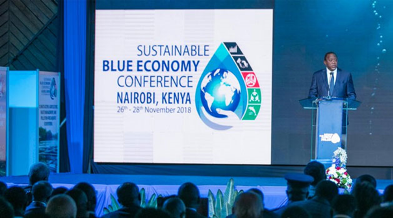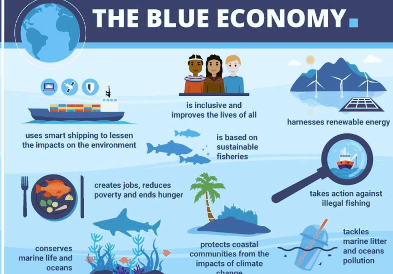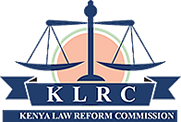 The first global conference on the Sustainable Blue Economy kicked off Monday 26th November, 2018 in Nairobi and brought together over 7,000 participants from around 100 states around the global including representatives from the Africa Union with the main theme “The Blue Economy and the 2030 Agenda for Sustainable Development”. The Conference aims to underscore the frameworks that will aid in the operationalization and transition to the Blue Economy in Kenya and globally that—
The first global conference on the Sustainable Blue Economy kicked off Monday 26th November, 2018 in Nairobi and brought together over 7,000 participants from around 100 states around the global including representatives from the Africa Union with the main theme “The Blue Economy and the 2030 Agenda for Sustainable Development”. The Conference aims to underscore the frameworks that will aid in the operationalization and transition to the Blue Economy in Kenya and globally that—
- (i) harnesses the potential of our oceans, seas, lakes and rivers to improve the lives of all, particularly people in developing states, women, youth and Indigenous peoples; and
- (ii) leverages the latest innovations, scientific advances and best practices to build prosperity while conserving our waters for future generations.
Kenya has been on the fore front of creating frameworks to operationalize the Blue Economy since 2016 as a key sector to drive the achievement of Vision 2030 development agenda through the established of a Presidential Taskforce on Blue Economy by His Excellency the President, Uhuru Kenyatta.
On fisheries, Kenya has enacted the Fisheries Management and Development Act, 2016 which created the Kenya Fisheries Advisory Council, Kenya Fisheries Service, and the Fish Marketing Authority. It further required the establishment of the Fisheries Research and Development Fund and the Fish Levy Trust Fund to support fisheries management in a sustainable manner.
Additionally, the Country has recently enacted the Kenya Coast Guard Service Act, 2018 which establishes a specialised Coastal Guard unit (KCGS), a multi-agency security service established to enforce law and order in Kenya’s territorial waters. This is to cure issues of piracy in the Indian Ocean, illegal fishing and border disputes.

Kenya has ratified the United Nations Convention on the Law of the Seas (UNCLOS) and domesticated its principles, among others, through the Maritimes Zones Act. UNCLOS is the general legal framework within which all activities in the oceans and seas must be carried out. UNCLOS outlines the rights and obligations of States in relation to navigation, protection and preservation of the marine environment. It provides legal certainty in a number of areas, including the delineation of maritime zones.
The Kenya Law Reform Commission (KLRC), as the key agency offering technical support to the national and county governments is committed to promoting and guiding necessary law reform interventions in the Blue Economy sector. This will undoubtedly be key in fostering a comprehensive and conducive legislative framework that is backed by adequate research and policy, for development government and private sector initiatives in support of a sustainable Blue Economy.
If you have any policy, research and legislative proposals on this subject, we would be happy to partner with you. Kindly get in touch
.
The writer is a legal expert in the Commission
{jcomments off}
